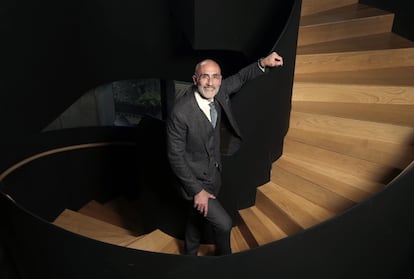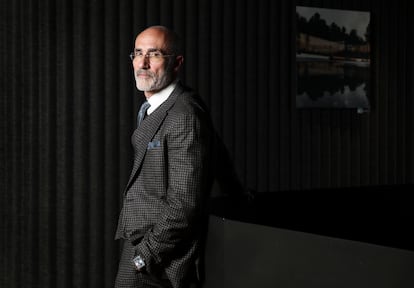Arthur C. Brooks of Harvard Business School: ‘Money does not increase happiness, it only reduces unhappiness; beyond $100,000, it doesn’t matter how much you have’
The leadership professor believes that well-being is not a destination, but rather a project based on four pillars: faith, family, friends and work

Arthur C. Brooks, 59, is not a happy man. He says that’s why he made happiness his field of study: at 31, this social scientist left his career as a horn soloist to pursue a doctorate in public policy analysis. Now, he teaches lessons about happiness and leadership at Harvard Business School (HBS), one of the world’s most prestigious business schools. Brooks is a columnist for The Atlantic and a bestselling author; he also served as the director of the American Enterprise Institute, a Republican Party think tank, for 11 years. The Spokane, Washington, native, who is married to a Catalan woman and just became a grandfather, spoke with EL PAÍS before giving a talk at IE University in Madrid.
Question. Philosopher Julián Marías said that happiness is a “necessary impossibility.” What does happiness mean to you?
Answer. When I ask my students on the first day of class, they answer that it is a feeling. They are wrong: if you are looking for a feeling, you will be constantly frustrated. Happiness is not a destination; it is a direction, a project. Everything worthwhile in life is a project; it’s not something that you have. Moreover, you have to go against the current, against the world and against nature on this path. Nature only wants two things for us: to survive and to pass on genetic material. It doesn’t care if we are happy or not. And if you listen to the mantra “if it feels good do it,” like the hippies did, you will end up destroying your life. You have to go against the tide of the economy, culture and especially Mother Nature...
Q. And what are the keys to this project?
A. Investing in four habits: faith or philosophy, a way of keeping perspective, so that you are not always focused on yourself; family; friendship and then work. The latter only needs to have two characteristics, neither of which are money, power or fame: earned success—that is, the idea of generating value with your efforts, which people know you do well—and service to others. That applies to any job.

Q. Tuition for an MBA at HBS is about $74,000 a year (over €68,000). As a professor, you teach people who, if they are not rich already, are going to make a lot of money. How do you approach the relationship between money and happiness with them?
A. The average salary after leaving HBS is $200,000. My class is the most popular one because my students know that everything they have done for years won’t make them happy. Some people think, “If I have success, money, pleasure and fame, I’m going to be happy.” That’s a mistake. I tell them that there is nothing wrong with money, but they have to understand its relationship with happiness: money does not increase happiness; it decreases unhappiness, and only up to a fairly low point, about $100,000. Beyond that, it doesn’t matter how much money you have.
Q. What’s the difference between reducing unhappiness and increasing happiness?
A. Happiness and unhappiness are not opposites; they occur in different parts of the brain. When we think we are having a good day, it means that the mix of these two sets is positive. There are four things you can do with money: spend it on things, spend it on having more time, spend it on buying experiences or donate it. Nature says you want to have more stuff, but this is never going to increase your happiness. However, if you invest it in your family and friends, it will increase your happiness, as will using it philanthropically. Ultimately, the secret is love.

Q. We live in an age of stress and anxiety, especially at work. In the United States, it has caused the Great Resignation. What can companies do to remedy this situation?
A. The Great Resignation does not exist, not even in the United States; it is a total fiction. Burnout is not the companies’ problem; it is a cultural problem: companies can do practically nothing about the four pillars of happiness. In the United States and around the world there is less and less faith, not just traditional faith like mine [Brooks is a practicing Catholic], but less and less spirituality. There are a lot of young people who say, “I’m not religious, but I’m spiritual,” but it’s neither one nor the other. Also, family is becoming less and less important. The problem of loneliness is catastrophic. Companies only have leeway in the work pillar by helping the employee to have a [sense of] purpose, but they can’t do anything for [employees’] faith or their family. The problem is cultural, not economic.
Q. If the problem is cultural, what cultural differences do you see between the United States and Spain?
A. In the United States, people work more; it’s the immigrant culture. Spain is more of a country of leisure. In the United States, when you meet a person, the first question is: what do you do? [In Spain] it’s: where do you go on vacation? It’s a window into the Spanish soul. When I’m here, I’m much more relaxed. I would love to live here, but my wife doesn’t want to [he laughs].
Q. Labor dissatisfaction often has to do with workers not feeling fulfilled by their work. What advice would you give to young people who are about to enter the labor market?
A. Usually when you go to a graduation, the speaker always says in their speech, “find a job you love, and you’ll never work a day in your life.” That’s lousy advice. You’re never going to find a job that’s always fun. The second piece of advice they give you is to “save the world,” which you’re never going to achieve. You have to find something interesting, which won’t always be fun or have an impact on the world, but it will always be yours. The most interesting thing for you is your vocation if you can make a living with it.
Sign up for our weekly newsletter to get more English-language news coverage from EL PAÍS USA Edition
Tu suscripción se está usando en otro dispositivo
¿Quieres añadir otro usuario a tu suscripción?
Si continúas leyendo en este dispositivo, no se podrá leer en el otro.
FlechaTu suscripción se está usando en otro dispositivo y solo puedes acceder a EL PAÍS desde un dispositivo a la vez.
Si quieres compartir tu cuenta, cambia tu suscripción a la modalidad Premium, así podrás añadir otro usuario. Cada uno accederá con su propia cuenta de email, lo que os permitirá personalizar vuestra experiencia en EL PAÍS.
¿Tienes una suscripción de empresa? Accede aquí para contratar más cuentas.
En el caso de no saber quién está usando tu cuenta, te recomendamos cambiar tu contraseña aquí.
Si decides continuar compartiendo tu cuenta, este mensaje se mostrará en tu dispositivo y en el de la otra persona que está usando tu cuenta de forma indefinida, afectando a tu experiencia de lectura. Puedes consultar aquí los términos y condiciones de la suscripción digital.









































